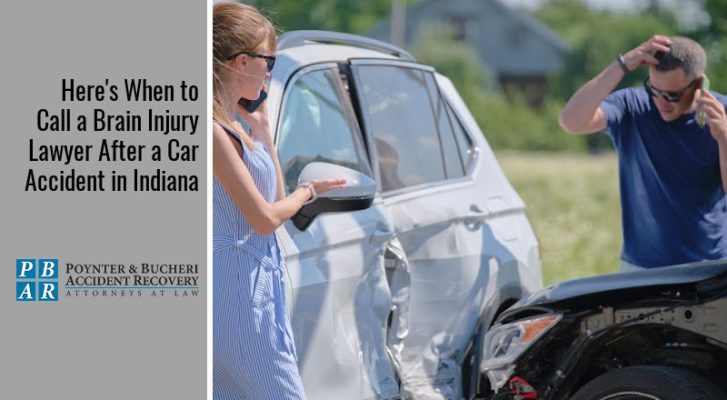
Here’s When to Call a Brain Injury Lawyer After a Car Accident in Indiana

Moderate and severe traumatic brain injuries can be life-altering, and in some cases, life-ending. If you or a loved one have been injured this severely as the result of another driver’s negligence, an experienced brain injury lawyer will be able to negotiate with insurance companies or even file a personal injury lawsuit for you.
Brain injury accidents are tragic – and all too common. In 2020, 223,135 people were hospitalized in the United States with TBI (traumatic brain injury) complications. Many other concussions (mild brain injuries) were treated in Emergency Departments, Urgent Care Centers, or doctors’ offices.
Statistics from the CDC paint a bleak picture:
Annual deaths from TBIs
- 2018 60,565
- 2019 60,611
- 2020 64,362
Of course, not all of these brain injuries were the result of motor vehicle accidents. Firearm-related accidents (and attempted suicides) are the most common cause of actual deaths related to traumatic brain injuries.
However, the two leading causes of traumatic brain injuries in the United States are falls (accounting for almost half of all brain injury hospitalizations) and motor vehicle accidents. Furthermore, traumatic brain injury from a car accident is the most common cause of brain injury for young adults.
What is a brain injury?
Any blow to the head or jolting of the head can cause the brain to be bruised or damaged. It’s true that people who suffer mild brain injuries (called concussions), can recover in 2-3 weeks. They will have to rest and may be given over-the-counter pain medication, but mild concussions are generally not life-threatening.
Concussion symptoms
- Headaches
- Problems with balance
- Dizziness and/or nausea
- Sensitivity to light or noise
- Difficulty focusing
- A general feeling of being unwell
- Forgetfulness
- Blurred vision
- Memory problems
- Sleep difficulties
- Irritability
- Depression
- Vertigo
- Apathy
- Restlessness
If these symptoms last for longer than expected (generally 1-2 weeks), you should return to your doctor or to the medical professional who treated you originally. There is no scan or imaging test that can see a concussion; the symptoms are a result of neurons that are unable to perform required actions because they can’t make necessary signals. However, your doctor will want to test you with an MRI or CT scan to make sure that there isn’t any sort of structural damage or bleeding in the brain.
If you were unsure, this is when to call a brain injury lawyer after a car accident. It’s obvious that you are going to have a host of medical bills, not to mention an extended period of time away from work, and you will need someone on your side to communicate with the insurance company on your behalf. You should also be aware that the longer you wait for treatment or diagnosis, the more difficult it may be to conclusively prove that your symptoms are a direct result of your accident.
Symptoms of Traumatic Brain Injury:
- Loss of consciousness
- Headache that does not go away or that gets worse
- Vomiting or nausea
- Convulsions or seizures
- Dilation of one or both pupils
- Fluids draining from the nose or ears
- Weakness or numbness in fingers or toes
- Clumsiness or loss of coordination
- Confusion
- Aggressive behavior or personality changes
- Loss of memory or concentration
- Slurred speech
Post-concussion symptoms can last from 3 months to 1 year; cognitive and emotional issues can disrupt every aspect of your life. This is a difficult situation, but in especially tragic cases, traumatic brain injuries can be so severe that there is never a return to a pre-accident condition.
Long-term effects
According to statistics published by the CDC, the five-year outcomes for people with TBIs leave a lot to be desired:
The CDC five year outcomes for people with moderate to severe TBIs are frightening:
26% improved
22% stayed the same
30% became worse
22% died
Five years after the precipitating accident, a staggering 57% of those with moderate or severe traumatic brain injuries who have survived are classified as being moderately or severely disabled, and 12% are unable to live independently outside of a nursing home or other institution.
As of 2022, the average yearly cost for a room in an assisted living facility in the United States was $4,635 per month; however, the necessity for memory care services for patients with brain injuries can inflate that amount by 30%-50%. Unfortunately, insurance companies often try to settle TBI cases for inadequate amounts.
What questions should I ask my Indianapolis personal injury lawyer after a car accident?
To achieve the best possible outcome from your case, make sure you are prepared. Here are some questions to ask your lawyer after your car accident to stay on top of your case and avoid any surprises:
- What information/evidence do I need?
- Do I have any deadlines to meet?
- How long will my case take?
- What damages can I recover?
- Will my case go to trial?
While this certainly isn’t an exhaustive list, it will give you a place to start when preparing to work your case with your lawyer.
After an accident caused by another driver’s negligence and a life-changing brain injury, it is crucial to have an attorney fighting for the compensation you both need and deserve. The traumatic brain injury lawyers at the Poynter & Bucheri Law Firm care about you and will fight aggressively for your rights.
